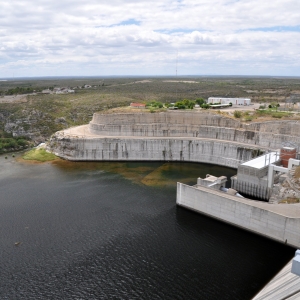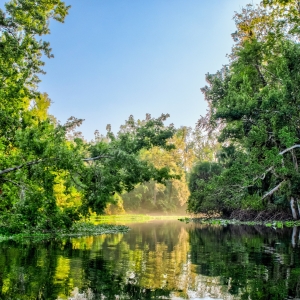The Stream, November 4, 2020: Study Uncovers New Dangers of Water Collection
YOUR GLOBAL RUNDOWN
- Women and girls are more likely to get injured collecting water in lower-and middle-class countries around the world, a new study finds.
- Hurricane Eta creeps towards Nicaragua’s coast.
- Ahead of the 2020 Election, Americans in key swing states say they are concerned about climate change.
- Cutting individual water consumption could delay a project more water into the Great Salt Lake in Utah.
Residents in Detroit, Oregon could be without clean water for the foreseeable future after a wildfire destroyed their water filtration plant.
“We actually have people moving back, some of them because they want to, some of them because they’re being housed by the insurance company. They had to move back, even when we told the insurance they don’t have water. And then the Red Cross is beginning to stop keeping people in hotels and rentals and people are anxious. A lot of people who still have homes, they can’t clean them.” – Detroit, Oregon Mayor Jim Trett. The city’s water filtration plant was destroyed in the Lionshead Fire in September and on Monday the City Council opted to lease a membrane filtration unit from Westec and have it installed to use non-potable water by December 1. Statesman Journal reports that residents could be without clean drinking water for months to come, however. Until water starts flowing into the pipes again, the city won’t know exactly how much damage was done to the water distribution system.
In context: Western Wildfires Damage, Contaminate Water Systems
IN RECENT WATER NEWS
U.S., Mexico Sign Rio Grande Water Agreement
Mexico is obligated under a 1944 treaty to deliver to the United States a set amount of water from the Rio Grande and its tributaries over a five-year period. As the end of the most recent period approached in late October, Mexico was behind on deliveries for a second consecutive cycle.
The last-minute agreement signed on October 21 settles the conflict. Mexico will transfer ownership of water stored in two border reservoirs to the United States to make up the deficit. Because the water is already in the reservoirs, this is an accounting move.
In Case You Missed It:
Who in the U.S. Is in ‘Plumbing Poverty’? Mostly Urban Residents, Study Says – Not everyone in the country has piped water at home. Study authors argue that water access in the U.S. is inseparable from housing and social inequality.
HotSpots H2O: Portland Environmental Groups, Backed by ACLU, Sue DHS for Use of Tear Gas – In Portland, environmental, public health, and social justice groups, represented by the ACLU of Oregon, sued the U.S. Department of Homeland Security for the health and environmental consequences of airborne chemicals.
What’s Up With Water – November 2, 2020 – This week’s episode looks at resumed negotiations over the Grand Ethiopian Renaissance Dam, federal government data in the western United States that shows historically low levels of vegetation dryness and one climate change adaptation tool that researchers found has a large water footprint.
New Study Reveals Additional Dangers of Water Collecting
A new study published in BMJ Global Health revealed that women and girls are more likely to suffer serious injuries from water collecting in low- and middle-income countries. The study found that 13 percent of the 6291 households interviewed reported one or more water-fetching injuries and nearly three-fourths of the respondents were women. The report concluded that their findings could be used to pinpoint other barriers to accessing safely managed drinking water, such as distance to a household’s primary water source.
TODAY’S TOP STORIES, TOLD IN NUMBERS
1,121,100 PEOPLE
A new study published in the Proceedings of the National Academy of Sciences found that nearly half of the estimated 1,121,100 people in the United States with insecure water access live in the country’s 50 largest metropolitan areas. Among houses without piped water connection, those headed by people of color are almost 35 percent more likely to lack piped water compared to white, non-Hispanic households. Unplumbed households are also more likely to earn lower incomes, live in mobile homes, rent their residence and pay a higher share of their gross income toward housing costs, the report found. The authors of the study conclude that further research into water disparities, in addition to policies for sustainable water access, are needed to curb the issue.
In context: Who in the U.S. Is in ‘Plumbing Poverty’? Mostly Urban Residents, Study Says
145 MPH (233 KPH)
Hurricane Eta was nearing the coast of Nicaragua on Tuesday as a Category 4 storm with sustained winds of 145 miles per hour (233 kilometers per hour), NPR reports. The National Hurricane Center in the United States said the storm is bound to hit Nicaragua with “catastrophic” winds, storm surge up to 15 feet (4.5 meters) above normal tides and flooding, along with possible landslides. Eta marks the 28th storm to be named in the 2020 Atlantic hurricane season, tying for the record set in 2005. The storm system is predicted to hit central Honduras on Thursday, where it will likely rapidly weaken.
ON THE RADAR
Water users in Utah could delay a project to siphon more water into the state’s Great Salt Lake by dropping their per-gallon-per-day consumption by 50 gallons (189 liters), a new study suggests. Deseret News reports that previous studies found that based on current consumption patterns, water levels in the Great Salt Lake could drop an additional 11 feet (3.3 meters) in the future. The latest study, commissioned by the Great Salt Lake Advisory Council, estimates the average water consumption per person in 2015 was 232 (878 liters) gallons per day. Conservation practices like expanded use of efficient toilets, less watering of lawns during the week, high efficiency washing machines and replacing turf on curbing areas to cut down on water waste should be implemented, the council said.
Jane is a Communications Associate for Circle of Blue. She writes The Stream and has covered domestic and international water issues for Circle of Blue. She is a recent graduate of Grand Valley State University, where she studied Multimedia Journalism and Women, Gender and Sexuality Studies. During her time at Grand Valley, she was the host of the Community Service Learning Center podcast Be the Change. Currently based in Grand Rapids, Michigan, Jane enjoys listening to music, reading and spending time outdoors.







Leave a Reply
Want to join the discussion?Feel free to contribute!